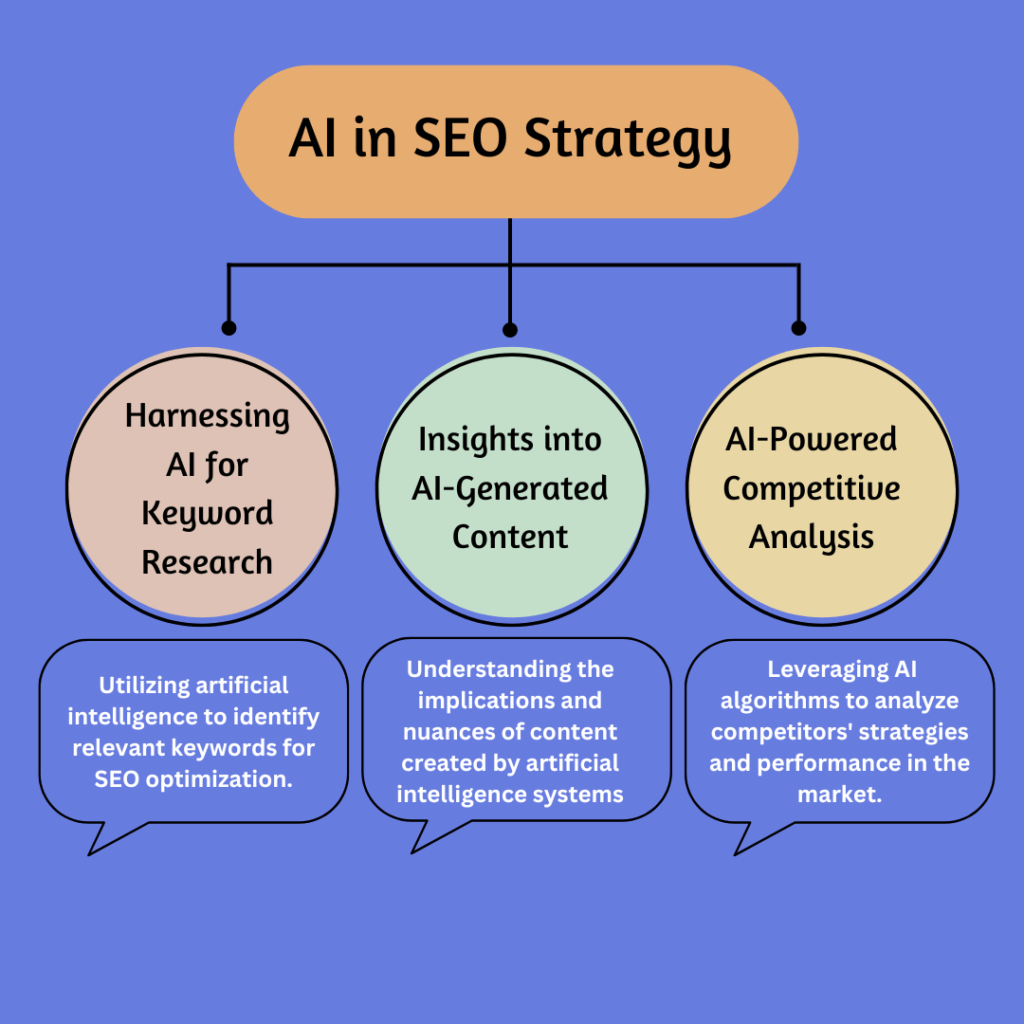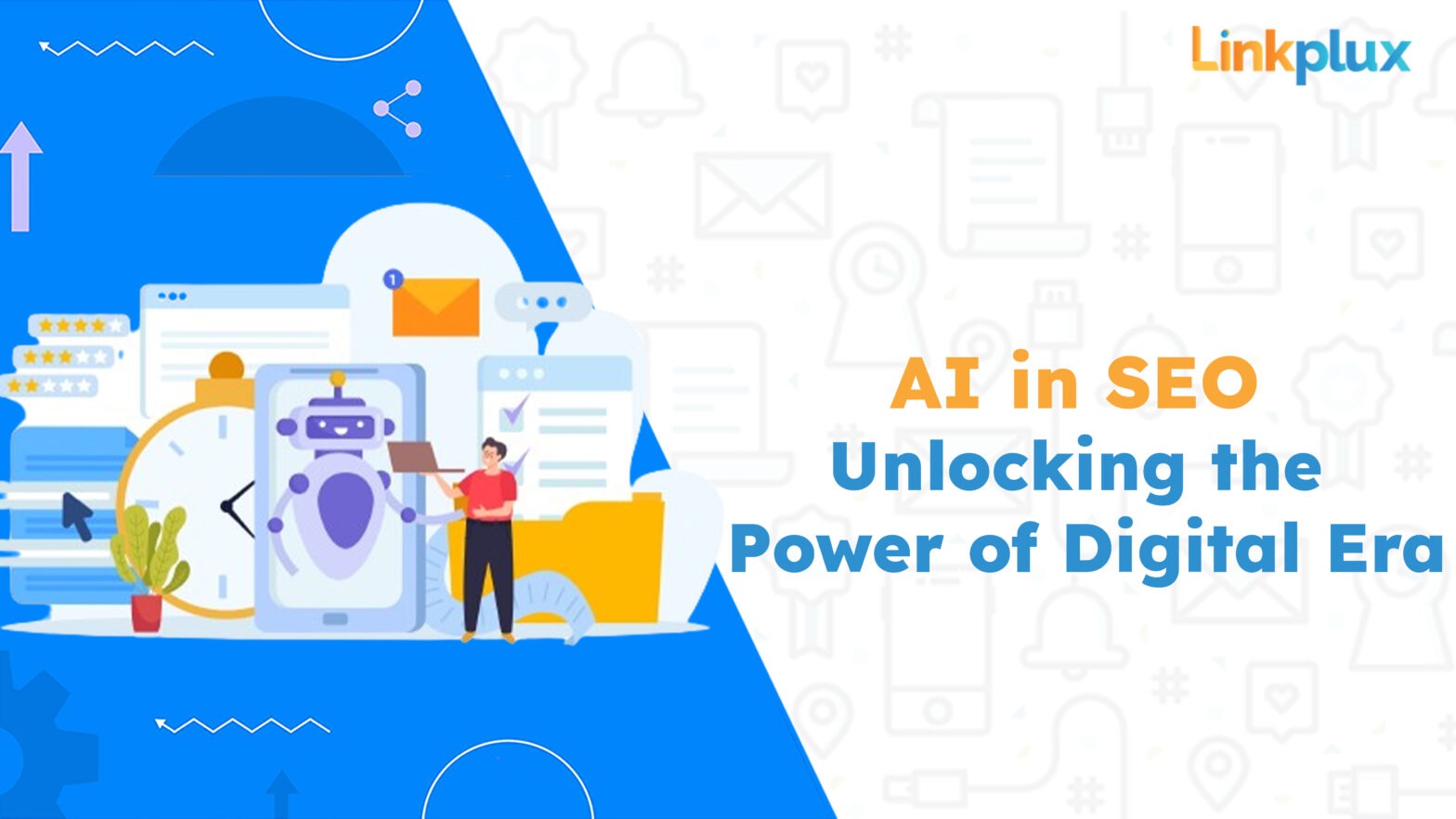In today’s digital age, Artificial Intelligence (AI) and Search Engine Optimization (SEO) are changing how businesses market online. AI’s thoughtful analysis and automation are reshaping search engines and companies’ strategies to stand out online. This overview explores AI’s significant impact on SEO. It shows how AI-powered search algorithms, personalized results, voice search optimization, and more are transforming SEO practices. These changes make digital marketing more precise and effective. Standing out online can be challenging. Business owners and marketers may need more consistent online visibility. They want solutions that give insights, boost their online presence, and help them compete. So, get ready to explore AI-powered SEO. It’s a journey into how AI is revolutionizing digital marketing.
The Digital Shift: AI in SEO
Artificial intelligence has revolutionized SEO by leveraging machine learning and advanced algorithms to analyze massive datasets, detect patterns, and forecast future trends. This unprecedented processing power has made AI a game-changer in the field of SEO.
With AI, SEO strategies are evolving beyond traditional keyword optimization. Instead, AI enables us to comprehend user search behavior and intent, allowing the creation of content that is not only keyword-rich but also highly relevant and engaging. This ensures alignment with search engine algorithms and user preferences, improving visibility and rankings.
Understanding AI’s impact on contemporary search engines is paramount as we navigate through this digital era. At the Marketing AI Institute, our research encompasses various marketing disciplines, including an in-depth exploration of AI in search. This expertise empowers us to optimize content ranking and stay ahead in the dynamic realm of digital strategies.
Exploring AI in SEO Strategy
AI tools are invaluable assets for enhancing your SEO strategy. By automating data analysis and identifying user behavior trends, they streamline the optimization process, freeing up time for strategic planning. Effective SEO begins with proper planning, and AI facilitates this by analyzing SERP rankings and offering actionable insights. This enables us to understand our current position and devise strategies for improvement. AI empowers us to be more strategic in our SEO endeavours. AI is pivotal in maximizing visibility and performance, from identifying high-performing keywords to crafting engaging content and optimizing our website.

Harnessing AI for Keyword Research
Keyword research and selection are vital components of content optimization and search engine marketing. They enable content creators and marketers to pinpoint the words and phrases that online users utilize to seek information, subsequently targeting these keywords to enhance visibility and drive website traffic. AI technology can significantly contribute to this process by efficiently analyzing vast datasets.
AI-powered tools facilitate content creators in identifying emerging keyword trends, monitoring keyword performance over time, and recognizing opportunities to exploit less competitive long-tail keywords. Through machine learning, AI can decipher user behavior and search patterns, offering insights into the intent behind various queries and suggesting the most pertinent keywords for content.
Moreover, AI aids in optimizing existing content for improved search engine rankings. By evaluating web page structure and content, AI tools can suggest keyword placement and density enhancements, thus assisting businesses in refining their on-page optimization strategies.
Insights into AI-Generated Content
Advanced AI models like OpenAI’s GPT-3 can generate human-like text, aiding in task creation, meta-description writing, and content improvement. While AI enhances efficiency, human creativity remains crucial for quality content.
In today’s competitive digital landscape, AI-powered SEO tools offer benefits for content optimization. AI helps identify relevant keywords by analyzing user data, enhancing content’s likelihood to rank well. It also aids in crafting engaging content by understanding user behavior and preferences and optimizing for both search engines and user experience.
Moreover, AI streamlines processes, saving time and resources by automating keyword research and on-page optimization tasks. AI empowers businesses to create optimized, engaging content efficiently, gaining a competitive edge and effectively reaching their target audience.
AI-Powered Competitive Analysis
AI extends beyond website optimization; it delves into competitor analysis, a vital aspect of refining our SEO strategy. AI tools scrutinize rival websites, uncovering strengths and weaknesses to furnish valuable insights. This analysis is a strategic advantage, keeping our business ahead in the competitive landscape and ensuring it stays at the forefront of the industry. Utilizing AI for competitor analysis empowers enterprises to make informed decisions, adapt swiftly to industry shifts, and maintain a resilient position in the ever-evolving digital realm.
Navigating the Boundaries of AI in SEO
AI is a valuable SEO tool but needs a quick fix for instant ranking improvements. Instead, it provides data-driven insights to inform decisions and optimize processes. Monitor their performance once you’ve configured your AI tools and achieved initial results. Be ready to adjust your strategy based on real-world feedback. Your adaptability and critical assessment skills, unique to humans, are essential. Remember, AI isn’t a replacement for your marketing or SEO specialist expertise; it complements your skills. Ultimately, the success of your SEO efforts depends on your strategic insights and decision-making.
The Road Ahead: AI’s Future in SEO
One prominent future trend in AI-powered content optimization is leveraging natural language processing (NLP) for crafting personalized and relevant content. NLP enables AI to comprehend human language, facilitating the creation of content tailored to specific audiences’ preferences and needs.
Another emerging trend involves using AI to develop interactive and immersive content experiences. Businesses can enhance engagement and prolong user interaction on their platforms by employing AI-driven tools for generating personalized videos, chatbots, and other interactive elements.
Furthermore, AI is poised to play a pivotal role in voice search optimization as more users rely on voice assistants like Siri and Alexa for queries. Businesses will need to adapt their content to rank effectively in voice search results, addressing challenges such as conversational language and long-tail keywords, which AI can assist in optimizing.
Lastly, AI will continue to streamline content optimization tasks, such as keyword research and on-page optimization, through automation. This automation enables businesses to allocate resources efficiently, focusing on broader marketing strategies while AI handles routine optimization tasks.
Closing Remarks
In summary, integrating Artificial Intelligence (AI) with Search Engine Optimization (SEO) is reshaping the digital marketing landscape, ushering in a new era of efficiency and personalization. As AI advances, it revolutionizes SEO by refining algorithms, automating tasks, and optimizing for voice search. However, businesses need to recognize AI as a tool that enhances human expertise rather than replaces it. Those who embrace AI-driven changes and harness its capabilities effectively will thrive in the evolving SEO landscape, bolstering their online presence and achieving digital success. The future of SEO is AI-powered, and businesses that adapt will lead the way.
FAQ’s
How does AI impact SEO strategies?
AI revolutionizes SEO by automating tasks like keyword research, content optimization, and data analysis. It enables more personalized user experiences, improves search engine ranking predictions, and helps marketers make data-driven decisions.
What AI tools are available for SEO optimization?
Various AI-powered tools assist in SEO tasks such as content generation (e.g., GPT-based writing assistants), keyword research (e.g., SEMrush, Ahrefs), and website optimization (e.g., MarketMuse, Clearscope). These tools leverage AI algorithms to streamline processes and enhance results.
Can AI help in predicting search engine algorithm changes?
While AI can’t predict specific algorithm changes, it can analyze historical data and trends to anticipate potential shifts in search engine algorithms. AI-powered tools can provide insights into algorithmic patterns and help SEO professionals adapt their strategies accordingly.
How does AI impact content creation for SEO purposes?
AI tools can aid in content creation by generating topic ideas, optimizing content for target keywords, and improving readability. Natural language processing (NLP) models like GPT can produce high-quality content that resonates with both search engines and users, saving time and resources.
Is AI capable of automating link building and outreach efforts?
AI can assist in link building and outreach by identifying relevant websites, analyzing backlink profiles, and personalizing outreach messages. Automated tools can streamline the process of finding link-building opportunities and managing outreach campaigns, but human oversight is still necessary for quality control and relationship-building.

